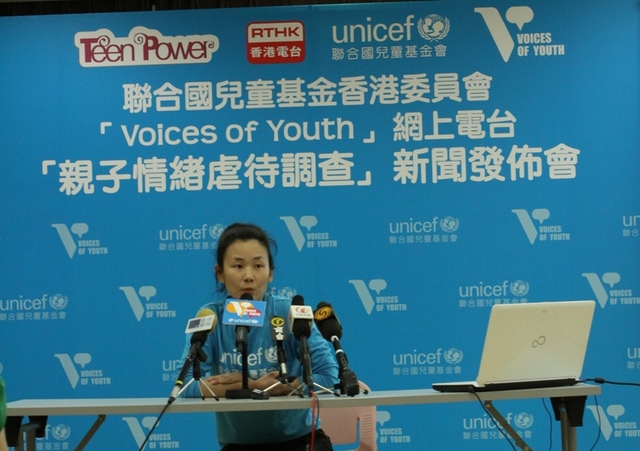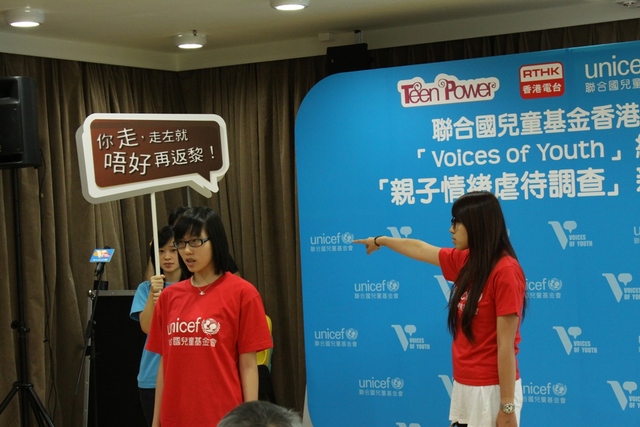HKCU announces survey findings on ‘Emotional Maltreatment in Family’ Half of the comments made by parents which hurt children the most involve criticism to ability Online radio station ‘Voices of Youth’ starts every Friday night from July
Hong Kong (2 July 2011) – Verbal violence is violence, while emotional maltreatment is also maltreatment. To investigate the parent-child interactions of families in Hong Kong and to raise the public awareness of emotional maltreatment, the online radio station ‘Voices of Youth (VOY)’ of Hong Kong Committee for UNICEF (HKCU) and fresh UNICEF Young Envoys 2011 jointly conducted a survey on ‘Emotional Maltreatment in Family’. Survey findings show that more than half of the comments made by parents which hurt children the most involve criticism to their abilities. Moreover, more than 30% of the parents think that ‘making jokes on children’s weaknesses when chatting’ and ‘scolding children loudly when they make mistakes’ are acceptable. HKCU reminds the public that emotional maltreatment will also impose adverse effects on the mental and physical development of children and youngsters. Many parents may have hurt the self images of children unconsciously in their daily lives, which resulted and may results in emotional maltreatment in family.
Emotional maltreatment refers to attacks on the 3 psychological aspects of children’s senses of worth, self and safety, such as ridicule, threats and intimidation. Emotional maltreatment inflicted upon children may have a range of negative behavioural impacts in their childhood and beyond. The survey on ‘Emotional Maltreatment in Family’ was conducted through street interviews and questionnaires from April to May this year by VOY and the Young Envoys. A total of 438 parents with children aged 6 to 15 and 503 students ranging from P5 to S3 participated in the survey.
The survey findings show that many parents in Hong Kong may have involved in emotional maltreatment on children relating to children’s abilities, especially that of their studies. Child respondents point out 83 comments made by parents which hurt them the most. Over half of the comments are related to parents’ criticism on their abilities and self images, such as ‘生嚿义燒好過生你!
(It is better to give birth to BBQ pork than you!)’ and ‘你做人好失敗!
(You are a failure!)’, in which nearly 25% involved comparisons with other children (see Table 1 for details). In fact, almost 90% of the student respondents think that ‘getting good results at school’ is their parents’ expectation; nearly 70% of them point out that their parents make comparisons to different extent once a month and 13% show comparisons more than 10 times a month.
| Also, many parents’ behaviour in daily lives has inflicted, involved or may lead to emotional maltreatment unconsciously. According to survey findings, over 45% of parent respondents think that ‘mild corporal punishment’ is acceptable and more than 30% of them accept ‘making jokes on children’s weaknesses when chatting’ and ‘scolding children loudly when they make mistakes’. Besides, over 20% of parent respondents think that ‘quarrelling with family members in front of children’, ‘arranging extra-curricular activities without discussions with children’, ‘punishing children who make mistakes by ignoring them’ and ‘making comparisons of children with others’ are acceptable. |
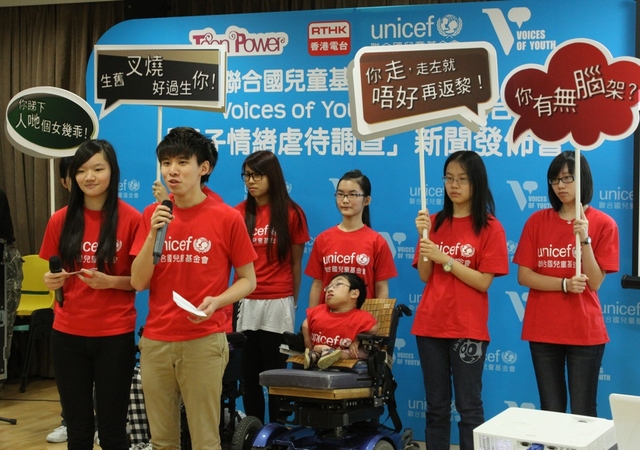
|
In addition, 70% of student respondents state that parents ‘scold you loudly when you make mistakes’ to different extent every month. Over 65% of them point out that parents ‘make comparisons of you with others’ and ‘quarrel with family members in front of you’ at least once a month. Half of the student respondents state that parents have scolded them using insulting languages, spoken foul languages in front of them and thrown away their personal belongings without noticing them. What’s more, over 10% of student respondents point out that parents speak foul languages, make comparisons of them with others and scold them loudly over 10 times a month, which frequencies are relatively high among the options.
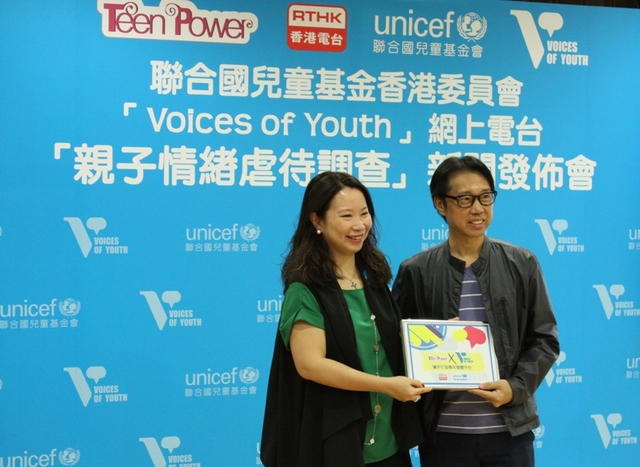
|
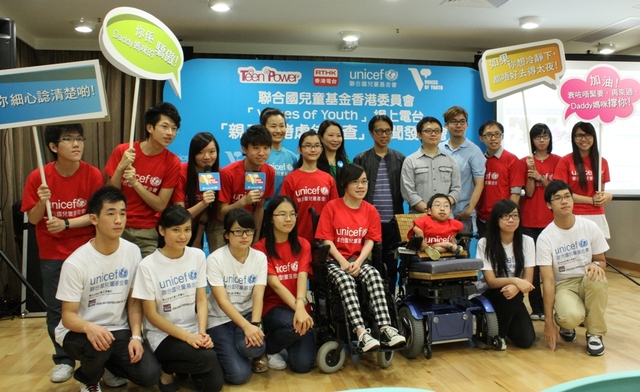
|
“The United Nations Convention on the Rights of the Child leaves no room for justification of violent, abuse or degrading forms of discipline.” said Ms Irene Chan, Chief Executive of HKCU, ‘Most emotional maltreatment on children is committed at home – and thus tends to be hidden.’ She reminded parents in Hong Kong not to overlook the verbal impact of comments which seem to be casual as they might lead to emotional maltreatment after repeated and long-term usage. Parents should be careful when filled with anger as making comments which hurt children on impulse damages parent-child relationships. HKCU urged the government to promote universal surveys on the mental health of children and youngsters so as to reinforce education to public and investigate the real situation of the society.
VOY host Rani Siu said, “Parents often hurt us when making comments, especially when they are angry. Having no response or complaint doesn’t mean that we think it’s alright. In fact, we just don’t want to intensify the situation, but the words may have already hurt us and we could never forget them.” HKCU’s online radio station VOY has been serving as a channel for youngsters to voice their opinions. This year, 4 students from Hong Kong Red Cross Princess Alexandra School will join the young hosts of the programme and ing voices of youngsters with special needs to the society. Starting from 1 July, HKCU will partner with Radio 2 of RTHK and launch a new series of VOY programme. The live show will be oadcast on the and new VOY website and RTHK’s Teen Power website from 7:00 p.m. to 8:00 p.m. every Friday. Audience is welcome to communicate instantly with the young hosts through various online social networks, such as facebook, msn and E-mails.
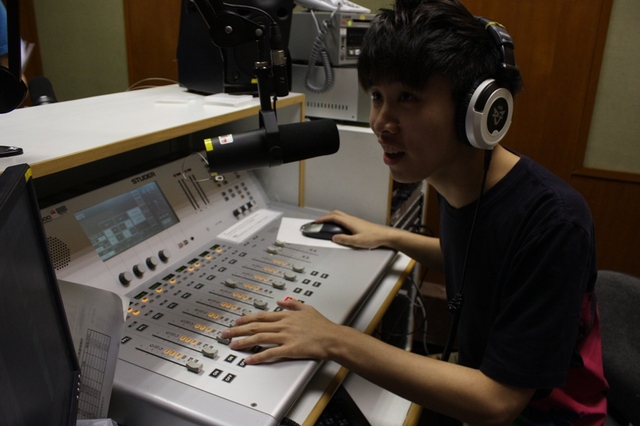
|
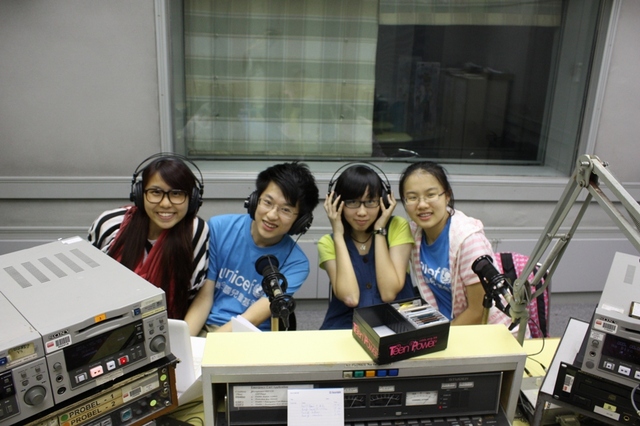
|
The VOY hosts will discuss the issue of emotional maltreatment in family with audience in the programme, while the 83 comments which parents hurt me the most’ will also be posted on the VOY website (Chinese version only) and open for public discussion. Mr James Fung, Head of RTHK Radio 2 said, “It is the first time for RTHK to partner with UNICEF to promote children’s right to participation. We hope that the newly launched VOY series can reach not only youngsters but also parents, adults and the whole society.”
New series of UNICEF’s online radio station ‘Voice of Youth’ starts in July
Live oadcast from 7:00 p.m. to 8:00 p.m. every Friday
To listen to or to review the programme, please visit: voy.unicef.org.hk or teenpower.rthk.hk
